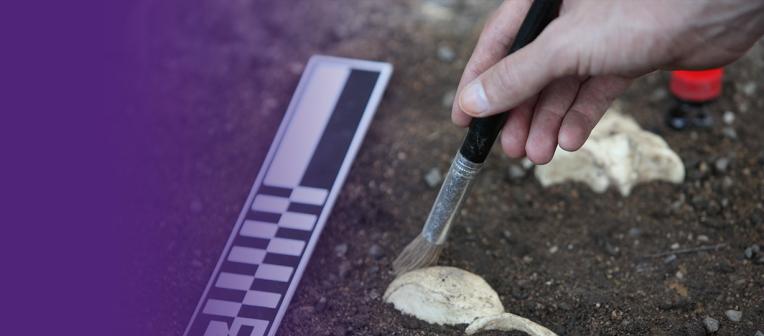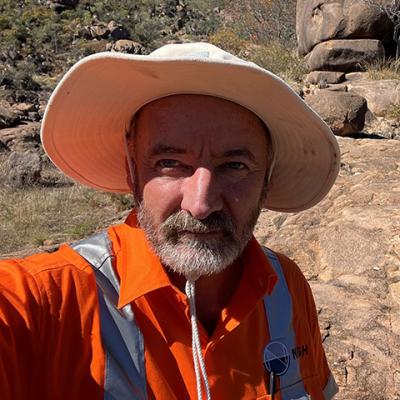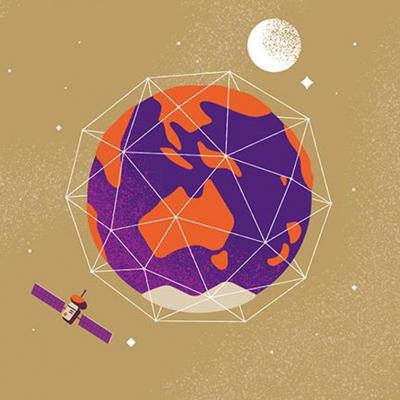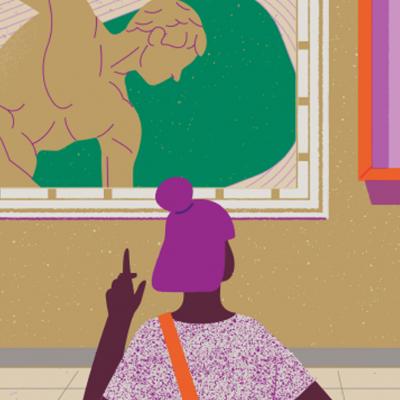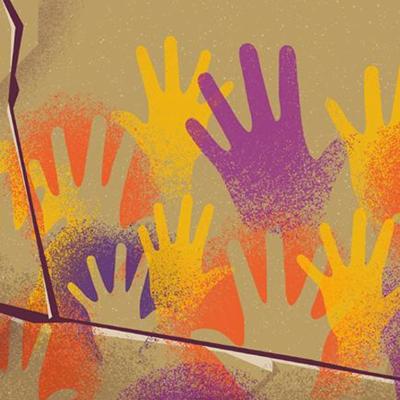Classic blockbuster movies like Indiana Jones, Tomb Raider and The Mummy paint a pretty spectacular picture of archaeology, but is it really all whips, hair flips and battling the undead?
In reality, archaeologists spend more time collecting data and recording findings than they do wielding revolvers and pioneering dangerous expeditions into the jungle. But we still think delving into history, uncovering past civilisations and protecting heritage sites is exciting work.
And what about the less titillating (but very important) aspects of pursuing archaeology as a career? We're talking about job security, career progression, salary and work environment, to name a few. These things need to be considered when weighing up if the field of archaeology is right for you.
We talk to two UQ graduates working in archaeology about their jobs, how they broke into the industry, what makes a good archaeologist and the common myths about this frequently romanticised career that they’re keen to debunk.
- Archaeology career paths
- What skills do you need to be an archaeologist?
- How to get a job in archaeology
- Archaeologist salary
Interested in studying archaeology at university? Explore UQ’s Bachelor of Arts, majoring in Archaeology.
Archaeology career paths
Let’s clear something up from the get-go: archaeology isn’t just about archaeological digs.
Kate Moody, a UQ graduate and archaeologist with the Tasmanian Government, wants you to know that there’s much more to the role than getting your hands dirty, even though this can be an exciting part of it.
“There’s often a general misconception of what archaeology is (it’s not just excavation!) and this translates into confusion or misunderstanding about a career in archaeology,” says Kate.
So, what types of jobs can you do after studying archaeology?
There are many career paths you can explore with a university degree in archaeology. The type of job you choose may rely heavily on your focus during your studies. For example, you may be interested in a specific time period in history, or a certain civilisation, or perhaps you’re more fascinated by maritime archaeology as a sub-field. Whatever the case, there are a variety of roles you can choose from, in a diverse range of organisations including government departments, consulting firms, universities, museums and large corporations such as mining and resource companies.
You may find yourself working as a:
- conservationist
- academic researcher
- archaeologist
- heritage consultant or manager
- museum curator
- museum education officer.
In Australia, many graduates tend to go down the cultural heritage path with their career, which involves protecting sites of historical significance affected by development projects, such as mining and construction.
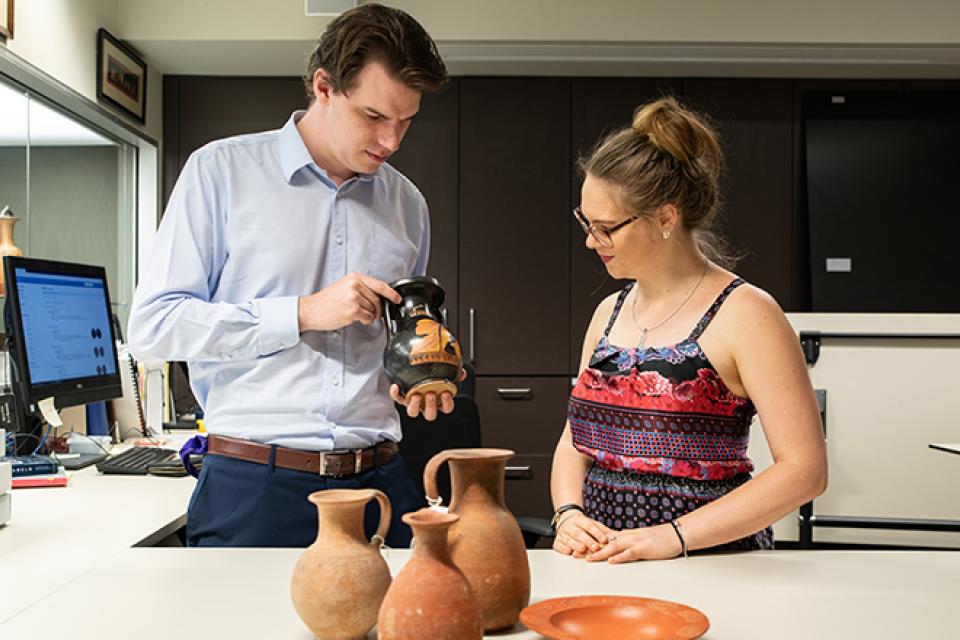
UQ’s Antiquities Museum – artefacts from the exhibition ‘Dionysos: Portrait of a God’.
What’s it like to work in the field of archaeology?
Tony Miscamble is a senior heritage consultant with NGH Consulting, and despite many people’s assumption that careers in archaeology involve predominantly solo work during excavations and documentation stages, Tony is quick to point out that his role is very people focused.
“Our clients include Aboriginal parties, proponents and government agencies,” says Tony.
“My role involves interacting with representatives of these different groups to ensure development projects comply with our legal and moral obligation to not harm our cultural heritage.”
In fact, Tony reveals that one of the things he loves most about his job is the opportunity to learn from different groups of people.
“I love working with Aboriginal people and walking on Country with them,” he says.
“Every day has the potential for discovery and for learning from each other.”
A day in the life of a senior heritage consultant
Tony’s role includes a combination of office and field work. His day-to-day duties in the office include:
- writing and/or reviewing tender proposals, safety documents and survey reports
- compiling, analysing and mapping field data
- meeting with clients and colleagues
- organising logistics.
When Tony’s in the field, his day usually looks a little something like this:
- Assemble a field team of up to 12 individuals for a safety pre-start meeting.
- Discuss the objectives and methods for the day.
- Drive to the site to excavate or survey.
- Use tablets to record archaeological data and images, and track logs.
- Make observations and field notes.
- Monitor the health and safety of the field crew throughout the day.
- Provide navigation back from the site.
- Check, clean and upload data collected.
Archaeologist responsibilities can vary depending on the nature of the role, but many are expected to take on leadership duties as their career progresses. On top of industry-specific training, archaeologists working in the field are often required to undergo first aid and 4WD training.
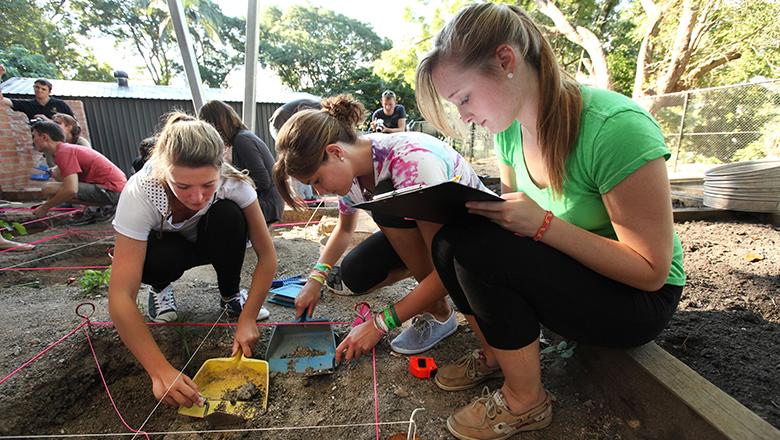
UQ archaeology students conducting a mock excavation at the Archaeology Teaching and Research Centre.
Is it hard to be an archaeologist?
There are two ways to view this question – is it difficult to study and work in archaeology, and is it a competitive industry to break into?
Let’s firstly address the question so often asked by popular media: is archaeology a dying field?
Here’s what the Australian Archaeological Association have to say about it:
“Archaeology is an employment growth area, and this is likely to continue. The rapid expansion of the cultural heritage management industry over the last three decades has created demand in the private sector for graduates with archaeological skills.”
Tony agrees with this viewpoint, further explaining how the Australian and global economies can impact career opportunities in archaeology.
“Most working archaeologists in Australia are employed in the private sector, and the majority of them would be working in resources, infrastructure and renewable energy,” he says.
“Well-paid career opportunities will continue to grow and follow the trajectory of the Australian economy, particularly as the global economy decarbonises.”
What skills do you need to be an archaeologist?
Whether your strengths and soft skills are suited to a career in archaeology will certainly dictate how difficult you will find studying and working in the field.
So, archaeologist skills: what are they?
“I think patience and attention to detail are helpful skills, as well as a genuine interest in and appreciation of cultural heritage and history,” says Kate.
Tony emphasises again that archaeology – and cultural heritage management in particular – focuses on people, so strong interpersonal and communication skills are a huge asset. An aptitude for, and love of, working collaboratively will also make any job in this area much more enjoyable.
How to get a job in archaeology
Because archaeology is so heavily based in research and focuses on building a specific skillset, university level studies are required to break into the industry.
Most archaeologists undergo 4 years of undergraduate study, including an honours year which gives individuals the chance to hone in on their areas of interest.
“My honours year in particular, with its focus on conducting, analysing and communicating a small research project, developed important skills and introduced me to a variety of archaeologists conducting research in Australia,” says Tony.
“Those connections in turn helped me develop a platform of skills and experience relevant to my career in cultural heritage management.”
How do you become an archaeologist?
Begin your journey to becoming an archaeologist with a Bachelor of Arts, majoring in Archaeology from UQ.
But when considering how to get into archaeology, Kate says you need to go above and beyond your structured studies.
“In addition to my university classes, I also had the opportunity to be involved with a number of exciting and enriching archaeology projects and excavations, both overseas and within Australia.”
“This not only gave me invaluable experience when I went to apply for roles, but it also helped me identify which aspects of archaeology I particularly enjoyed and was interested in,” she says.
Kate encourages anyone studying archaeology to look into volunteering and fieldwork, to further their skills and increase their employability when searching for archaeology graduate jobs.
The UQ Archaeological Society (UQAS) is a student-run society and is a great place to start making connections and finding opportunities to gain experience while you study.
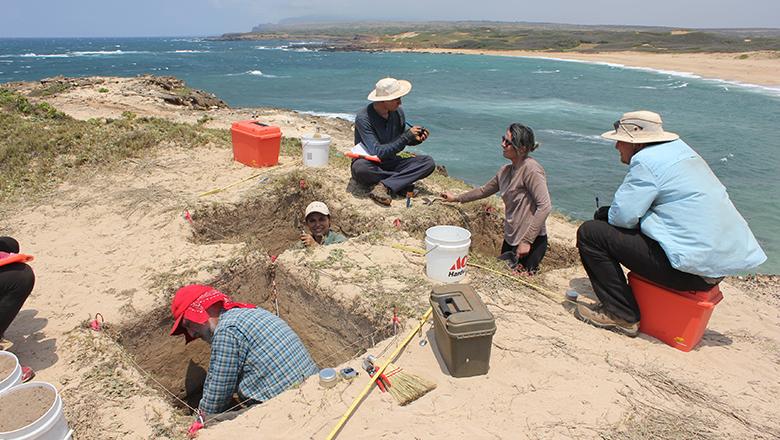
UQ Archaeology Field School students taking part in an excavation in Hawaii.
Tony agrees, adding that taking every opportunity to expand your network of contacts within the industry is vital. He also recommends developing your own ‘unique selling proposition’ to help you stand out from other graduates.
“For me that was an interest in drones and the ways aerial imagery and photogrammetry could help solve archaeological problems, record and present archaeological findings,” says Tony.
For those interested in pursuing a career in cultural heritage management, Tony’s advice is straightforward.
“Focus on developing good GIS literacy and reliable stone tool identification skills, as these will serve you well almost every day in your future career.”
Do archaeologists get paid well?
An archaeologist’s salary depends on many factors, with the sector they’re working in and their level of experience being two of the most impactful. On average, archaeologists in Australia make around $71,000 a year (based on 69 salary profiles on Payscale.com).
Entry-level positions generally start at around $60K and mid-career archaeologists tend to earn around the $80K mark, while archaeologists with over 20 years of experience can be earning $145K.
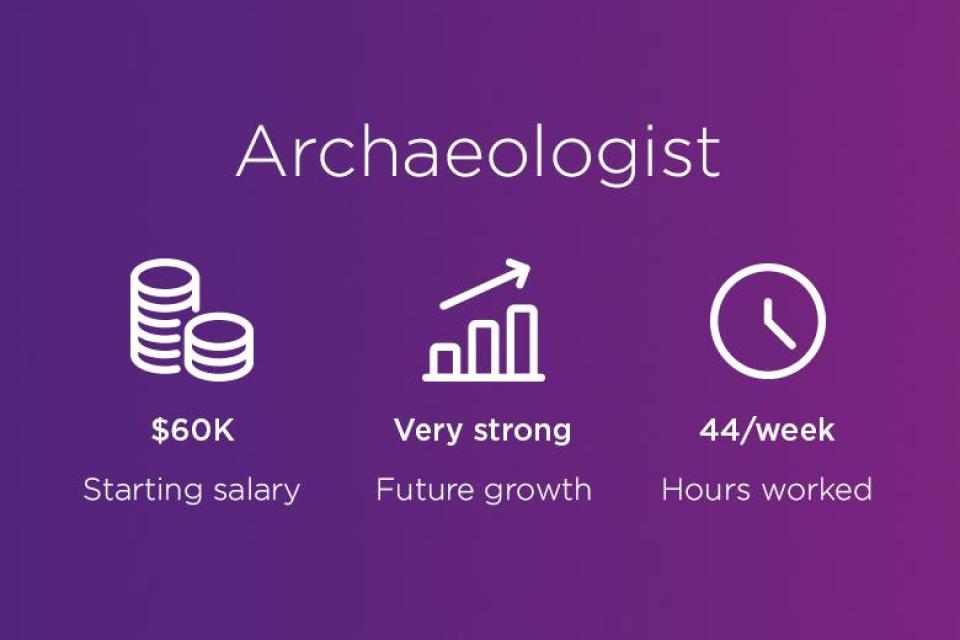
Information sourced from Payscale, Your Career and Labour Market Insights.
Do archaeologists get to travel?
Travel is a key component of a career in archaeology, both within Australia and abroad. Depending on your specialisation, specific role and areas of interest, you may find yourself seeking employment around the globe. But there’s some pretty cool stuff right here on our doorstep too.
“In my current role, I am lucky enough to undertake fieldwork in some stunning wilderness areas of Tasmania, which is a privilege as many of these areas are quite remote and are not easily accessible,” says Kate.
Tony speaks honestly about the nature of travel in his work, outlining both the exciting and challenging aspects of it.
“The nature of cultural heritage work in Australia involves travelling to remote and regional locations, so there is a lot of fly-in-fly-out (FIFO) and drive-in-drive-out (DIDO) work – good for frequent flyer points but challenging for relationships,” he says.
“You will get to see places and meet people way off the main street. If you are drawn to the challenge and adventure of that, then you’ll thrive.”
Working with likeminded, passionate people
Those who pursue a career in archaeology are often passionate people with a real love for what they do. There are many challenging aspects to being an archaeologist, but also countless rewarding experiences. Many of these experiences revolve around collaborating with others.
“Moments of shared excitement about finds and the many laughs enjoyed in the field are among the greatest joys in the job,” says Tony.
He shares some tips for moving in archaeological circles and being part of a relatively small industry.
“In general, be honest, consistent and authentically yourself. Be someone that others will want to work with, whether that is in an air-conditioned office or long, hard days in difficult conditions,” he says.
“Be good at what you do and have a sense of humour. Archaeology is a small community, and your reputation is important because it not only follows you, but also arrives before you.”
Think a career in archaeology is for you? Before you leave to explore your study options, let’s return to that all important question: is archaeology all it’s portrayed to be in the movies? Tony has some parting advice.
“Dinosaurs and aliens may be interesting, but neither have anything to do with archaeology. Whips and revolvers should be left at home.”
Explore UQ's Bachelor of Arts majoring in Archaeology or discover more careers in the humanities.

